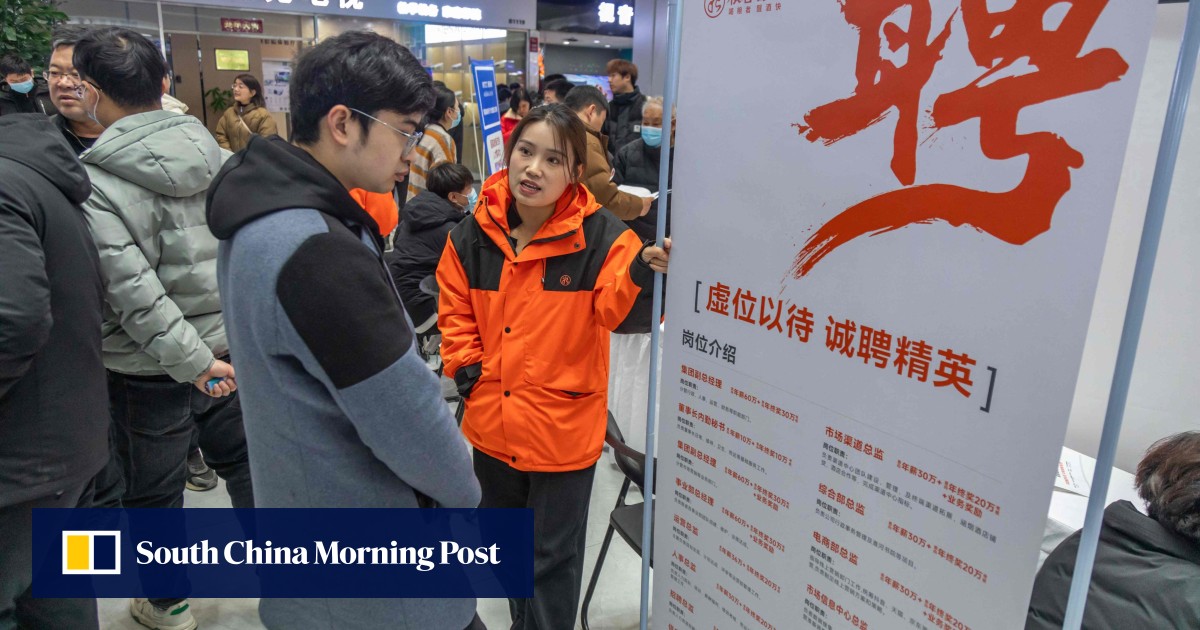“I can accept a waiter job of about 4,500 yuan (US$650) or 5,000 yuan since production line workers are expected to earn about the same this year,” he said.
Factories are not struggling to recruit workers this year
Thirty-something Xu Chao was also hoping to find a job in a car parts factory in Jiangsu.
“I’ve been in Guangdong for a few days. The wages are not as good as I thought. There are more electric car companies in the Yangtze River Delta, the opportunities and salaries there may be better” Xu said.
Most returning workers have low expectations for a pay rise this year, as the number of jobs in the service or manufacturing sectors is not as high as last year.
Dongguan, an export hub in Guangdong which is often the top choice for rural migrant workers, anticipated 163,000 job vacancies after the Lunar New Year, the state-backed China Youth Daily reported earlier this month, citing the local labour and social security bureau.
The figure was 176,500 last year and between 250,000 to 300,000 in 2022.
“With fewer export orders, there have been more workers than positions in local companies. Factories are not struggling to recruit workers this year, as lots of migrant workers from Guizhou and Henan have already come back,” said Justin Xu, a manufacturer of lighting products for exports in the eastern province of Zhejiang.
The influx of migrant workers is occurring as there are less opportunities in hinterland provinces, with jobseekers in Henan – China’s third most populous province and a key source of migrant workers – crowding a recent job fair.
“Our company has a labour gap of about 20 people, but more than 60 people have expressed interest in applying,” a human resource manager said, according to the state-run Henan Daily.
The arrival of migrant workers has already reduced the hourly wage for temporary workers in China’s export hubs of Shenzhen and Dongguan by around a third from three years ago to between 18 yuan (US$2.5) to 19 yuan after the Lunar New Year holiday, according to an employee surnamed Li at a recruitment agency in Guangzhou.
Factory owners, if they have any surplus money, are considering investing in plants abroad
The period following the Lunar New Year is traditionally the most understaffed and high-paying time of the year as lots of workers remain at home.
Li partly attributed the weak demand to factories relocating overseas and corporate endeavours to reduce costs.
“Factory owners, if they have any surplus money, are considering investing in plants abroad, which is the only area where they’re still willing to expand,” said Peng Biao, a textile and clothing supply chain specialist.
However, overall expectations from factory profits to orders could be even lower this year, Peng added.
Demand for workers in the new energy infrastructure sector is set to be stronger than last year, but employers are not worried about a shortage even at tough construction sites.
Wang Rongshuo, founder of the Guangzhou-based Yangshuo Green Construction, said the photovoltaics infrastructure integrator already has a waiting list for the 3,000 construction workers it plans to recruit this year.
“We have a lot of projects across the country. The workers will need to move throughout the year to different construction sites.” Wang said.
“Most of our workers are aged between 30 and early 40s. They can earn about 8,000 yuan a month.”
The labour surplus is also being seen in some regions in Zhejiang.
We’re doing migrant workers’ business, and their income this year may be worse than last year
“Some factory owners have not yet started production so far this year, mainly due to insufficient export orders and operational difficulties,” according to Zhou Libin, manager of Tianshu Mechanical Technology.
In the past, many cities or counties in Zhejiang chartered cars and planes to lure workers from central and western parts of China back at this time of the year, however, this was not the case this year, according to Zhou.
“Perhaps the government is aware of the limited orders and insufficient production,” he added.
Economic uncertainty in the manufacturing sector has also affected the small and micro service sector.
“Last year I hired a helper, but I don’t plan to hire anyone this year. My husband and I will work harder. Utility bills are increasing, but we dare not raise prices. We’re doing migrant workers’ business, and their income this year may be worse than last year.” said Li Jie, who runs a breakfast room in Jiangxi.

